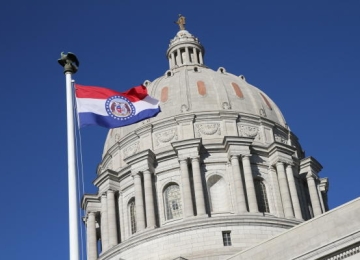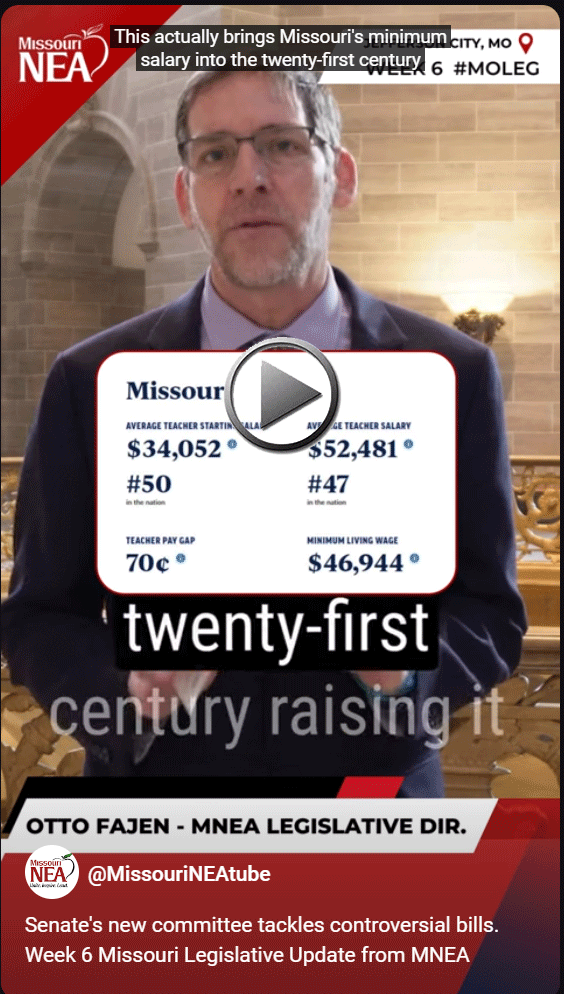CAPITOL ACTION DAYS
Capitol Action Days are part of the Association's plan to promote positive policy for public education. MNEA's Capitol Action Days began on February 7th with members from Governance Districts 2 and 10 visiting the Capitol and meeting with legislators. For more information and to register for your Capitol Action Day, please visit https://www.mnea.org/CAD.
SENATE ROLLS BILLS TO THE INFORMAL CALENDAR
The Senate took up bills for the first time this session on February 7. None of the bills was given first round approval (Perfection vote). All eleven bills on the formal calendar that day were placed on the informal calendar. Bills on the formal calendar must be taken up in order when the Senate is on that order of business.
The informal calendar operates differently and is essentially a parking lot. A bill placed on the informal calendar can be taken up when the Senate goes to that order of business and the Majority Floor Leader decides to recognize the sponsor to bring the bill before the body. However, a bill placed on the informal could, instead, languish on the informal calendar for the remainder of the session and never be debated.
STATE OF THE JUDICIARY
The House and Senate convened in joint session on February 7 to hear the State of the Judiciary Address for 2024.
BUDGET
The House Budget Committee and Senate Appropriations Committee each met several times during the week to hear budget presentations regarding state agencies other than DESE (K-12) and DHEWD (higher education).
TAX CREDIT VOUCHERS
The House Special Committee on Education Reform will meet on February 12 to hear four bills that would expand the existing tax credit voucher enacted in 2021.
HB 2104 (Phil Christofanelli) and HB 1738 (Doug Richey) are similar bills that make several changes. Each bill expands the program to include all counties in the state, increases the allowable annual amount of credits to $75 million, and raises the qualifying income threshold to 400% of the income eligibility for reduced price school lunch. The bills also increase the maximum per student award by multiplying the State Adequacy Target (currently $6375) by the formula factors for students with identified needs.
HB 1615 (Brad Hudson) expands the program to include all counties in the state, while HB 1671 (Mark Matthiesen) removes the requirement that a qualified student be a kindergarten or first grade student or have attended at least one semester full-time at a public school within 12 months prior to participation. The Association opposes all four of these bills to expand the tax credit voucher program.
OPEN ENROLLMENT
The Senate Select Committee on Empowering Parents and Children heard SB 1051 (Curtis Trent) regarding public school open enrollment on February 6. The Missouri NEA believes that public school choice plans with state funding may harm students and our public schools unless essential criteria are in place for implementing, monitoring, and evaluating their effectiveness. SB 1051 shares many provisions in common with HB 1989 (Brad Pollitt). Unlike HB 1989, SB 1051 allows non-resident pupils to transfer to charter schools as well as to other school districts. The bill also lacks a number of other essential criteria contained in HB 1989. The Association opposes SB 1051.
TEST, BLAME AND PUNISH BILL
The Senate Select Committee on Empowering Parents and Children also heard SB 1366 (Curtis Trent) on February 6. The bill specifies a detailed methodology for calculating school building performance scores based primarily on student scores on standardized tests. The bill does not provide any structure to provide support to help schools improve. The bill hearkens back to the now-abandoned "test, blame and punish" mindset of the former, federal NCLB Act. The Association opposes the bill.
TEACHER RECRUITMENT AND RETENTION
The House Elementary and Secondary Education Committee heard HB 1447 (Ed Lewis) and HB 1431 (Willard Haley) on February 7. Both bills would raise the minimum teacher salary in Missouri from $25,000 to $38,000. HB 1431 raises the minimum salary for teachers with ten years of experience and a master's degree to $46,000 for the 2027-28 school year. HB 1447 increases the minimum salary for teachers with ten years of experience and a master's degree to $48,000 for the 2029-30 school year and also provides an annual inflationary increase for both salary levels. Both bills create a grant fund that could be used for three years to provide matching funds for salary increases.
The Association believes that salary schedules should provide for entry-level salaries and career earnings comparable to those of other professions and occupations with similar preparation and responsibilities. Increasing minimum salaries is a positive step in meeting this standard.
HB 1447 contains additional provisions to specify how a district may place teachers on the salary schedule for hard-to-staff areas and hard-to-staff schools. HB 1447 also eliminates the high-stakes entry exam for teacher prep programs and revises the "Urban Flight and Rural Needs Scholarship Program" by increasing the number of scholarships and focusing them on teachers agreeing to serve in hard-to-staff subjects and hard-to-staff schools.
INITIATIVE PETITION
The House Elections and Elected Officials Committee heard two more joint resolutions that seek to change the initiative petition process and the process of amending the Constitution. HJR 67 (Hardy Billington) increases the number of signatures required to qualify a petition for the ballot, and HJR 93 (Bill Falkner) requires all petitions certified by the Secretary of State to be heard in a committee and debated on the House floor.
The Association is concerned that the resolutions will make it more difficult for Missouri citizens to bring forward and gain approval on measures of interest brought by the initiative petition process and opposes both joint resolutions.
FULL-TIME VIRTUAL SCHOOLS
The House Special Committee on Education Reform approved HB 2287 (Phil Christofanelli) on February 5. The bill makes minor revisions to clarify the new structure of accountability, enrollment, participation, and finance created enacted for full-time virtual schools in 2022 by SS/HCS/HB 1552 (Richey). The Association supports the bill.
The Senate approved SCR 23 (Nick Schroer) on February 5. The SCR disapproves and suspends the final order of rulemaking for a rule proposed by DESE relating to the Virtual Instruction Program. Several provisions in the rule were inconsistent with the provisions enacted for full-time virtual schools in 2022. The SCR now moves the House for further consideration. The SCR must be approved by both chambers within the first thirty legislative days of session (by the end of the month) to permanently suspend the rule.
STUDENT HEALTH AND SAFETY
The Senate Select Committee on Empowering Parents and Children heard two bills relating to cardiac emergency response plans on February 6. SB 1032 (Karla Eslinger) and SB 1081 (Lauren Arthur) both require public schools to develop and implement a cardiac emergency response plan. The bills require coordination with emergency service providers, include guidelines for the plans, and require relevant training for appropriate personnel. The Missouri NEA believes that all schools must have written plans that delineate procedures regarding emergencies. The Association also believes that education employees should have the opportunity for training in CPR and the proper use of defibrillator, Naloxone, and epinephrine dispensers by qualified personnel. The Association supports the bills.
BULLYING AND SCHOOL DISCIPLINE
The House Elementary and Secondary Education Committee will also hear HB 1715 (Tricia Byrnes) on February 7. The bill requires DESE to create a model policy to address bullying and school discipline. Each school district must adopt the policy, and the policy must restrict zero-tolerance disciplinary policies for any student that is a victim of bullying or is defending a victim of bullying. The bill includes staff training requirements designed to educate students who are victims of bullying on techniques to overcome bullying's negative effects. The bill also requires monthly reporting to the school board on acts of bullying and disciplinary referrals. The bill provides immunity for staff who intervene in an act of school violence or bullying under the defense of justification, based on the legal authority granted by the bill.
SPECIAL EDUCATION
The Senate Select Committee on Empowering Parents and Children heard SB 812 (Mary Elizabeth Coleman) to require parental consent for changes to individualized education programs (IEPs).
HIGHER EDUCATION FREE SPEECH ISSUES
The House Special Committee on Government Accountability heard HB 1518 (Brad Hudson) on February 5. The bill would prevent a public college from limiting recognition to belief-based student associations that require leaders to adhere to its beliefs, practice requirements or standards of conduct. The Association believes that organizations are strengthened by offering memberships on a nondiscriminatory basis. The Association opposes the bill.
HOUSE-SPECIAL COMMITTEE ON EDUCATION REFORM
The committee heard two bills on February 5:
HB 1502 (Gretchen Bangert) to require school districts to provide instruction in cursive writing by the end of the fifth grade, including a proficiency test of competency in reading and writing cursive.
HB 2156 (Philip Oehlerking) to add two charter school members to the board of trustees of the St. Louis Public School Retirement System. The Missouri Public Charter School Association would appoint the new members. The Association believes that decisions affecting public school retirement systems should be made by a board elected by the members of those systems. The Association opposes the bill.
SCHOOL BOARD CANDIDATE FILING PROVISIONS
The Senate Local Government and Elections Committee heard SB 774 (Elaine Gannon) on February 5. The bill would change the filing window for school board candidates by moving both the starting and ending dates one week later. The result would be a filing window that extends from mid-December to the first week of January.
FINANCE EDUCATION
The House Elementary and Secondary Education Committee approved a committee substitute (HCS) version of HB 1727 (Michael O'Donnell) on February 7. The bill requires DESE to create a workgroup to develop academic standards on personal finance. The bill requires high school students to pass a one-half unit of credit in personal finance as a requirement for graduation. The HCS version of the bill ensures that at least 25% of the members of the DESE workgroup will be active teachers.



